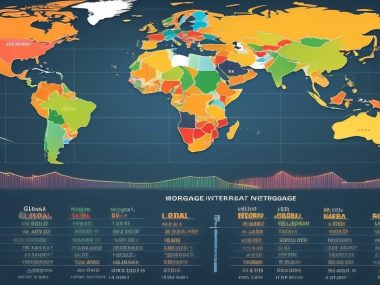Staggeringly, mortgages work quite differently around the globe. From Switzerland’s mandatory savings accounts to Japan’s fixed-rate loans, each country has its unique approach to homeownership financing. Exploring these diverse systems can offer valuable insights into alternative ways of managing property purchases and loans. As I delve into how mortgages function in various countries, you’ll discover intriguing practices that might revolutionize your perspective on home financing and overseas lenders, loan terms, banks, and houses.
Key Takeaways
- Understand the global mortgage landscape to grasp how mortgages work in other countries.
- Familiarize yourself with different mortgage processes and procedures worldwide to navigate foreign mortgage applications effectively.
- Stay informed about country-specific regulations governing mortgages in various parts of the world to ensure compliance and avoid pitfalls.
- Consider the influencing factors such as economic conditions, government policies, and cultural norms when exploring mortgage options abroad.
- Be aware of interest rate variations across countries and regions to make informed decisions regarding mortgage financing internationally.
- Implement practical tips and advice from the article, including seeking professional guidance, conducting thorough research, and comparing mortgage offers diligently.
Global Mortgage Overview
Interest Rates
Interest rates vary significantly across countries, with some nations experiencing higher rates than others. Comparing current interest rates globally provides insights into the affordability of mortgages in different regions from overseas lenders, banks, and the percent of home ownership. Understanding how interest rates influence mortgage payments is crucial for potential homebuyers to make informed decisions. Analyzing trends in interest rate fluctuations helps predict future mortgage costs.
Loan Terms
Exploring typical mortgage terms in various countries reveals diverse options available to borrowers. Understanding the maximum and minimum mortgage terms helps individuals choose a suitable repayment period. Comparing short-term versus long-term mortgages showcases the advantages of each option. For instance, short-term mortgages offer quicker debt repayment but may come with higher monthly payments.
Down Payment
Different countries have varying minimum down payment requirements for securing a mortgage. Discussing these requirements sheds light on the financial commitment needed from homebuyers. Exploring how down payments affect mortgage approval highlights their significance in the home buying process. Comparing down payment percentages across regions showcases the financial differences in purchasing properties worldwide.
Eligibility Criteria
Understanding key eligibility requirements for mortgage approval is essential for prospective homebuyers. Exploring how income levels impact eligibility provides clarity on financial prerequisites for obtaining a mortgage. Discussing the importance of credit scores emphasizes their role in determining loan approval chances.
Mortgage Processes
Application Steps
To apply for a mortgage, first gather financial documents like pay stubs and tax returns. Next, complete the loan application form accurately. Ensure all information is up-to-date and correct to avoid delays. Submit the application along with the necessary documentation to the lender.
During the application process, documents such as income verification, credit history, and employment details are crucial. Providing accurate information is key to a smooth approval process. Common pitfalls to avoid include missing deadlines, submitting incomplete forms, and neglecting to disclose debts.
Approval Timeframes
Mortgage approval timeframes vary across countries, with some taking weeks while others take months. Factors influencing approval speed include credit score, debt-to-income ratio, and property appraisal time. Pre-approval can expedite the process by showing sellers you are a serious buyer.
In my experience, getting pre-approved before house hunting was beneficial as it gave me a clear budget range. Understanding the importance of pre-approval helped me secure my dream home faster than expected.
Documentation
Essential documents for a mortgage application include proof of income, identification papers, bank statements, and tax returns. Accurate documentation is crucial for verifying financial stability and ensuring loan approval. Digital documentation has made the process more efficient by allowing quick submission and review of paperwork.
Country-Specific Regulations
USA
In the USA, mortgages operate under local laws that differ from those in other countries. The mortgage market here is characterized by a variety of loan options and competitive interest rates. One unique feature is the prevalence of fixed-rate mortgages, providing stability to homeowners.
The current trend in the US housing market shows a rise in demand for homes, leading to increased competition among buyers. This surge has also resulted in escalating property prices, making affordability a concern for many aspiring homeowners. Government-backed mortgage programs like FHA loans aim to assist first-time buyers in achieving homeownership.
UK
Comparing mortgage practices in the UK with other countries reveals a focus on affordability and responsible lending. The impact of Brexit on the UK mortgage market has been significant, leading to fluctuations in interest rates and housing demand. Government initiatives such as Help to Buy schemes play a crucial role in supporting homeownership for individuals with limited savings.
In my personal experience, navigating through the complexities of mortgage options can be overwhelming. Researching thoroughly and seeking advice from financial experts helped me make informed decisions regarding my home purchase.
Canada
In Canada, interest rates play a pivotal role in shaping the mortgage market landscape. Variable rate mortgages are popular due to their flexibility in adjusting to market changes. Economic factors like employment rates and inflation directly influence mortgage rates, impacting affordability for borrowers.
Exploring different types of mortgages available allowed me to tailor my choice based on my financial goals and risk tolerance.
Australia
The Australian mortgage market is heavily influenced by property prices, which can fluctuate significantly across regions. Foreign investment also plays a role in driving demand for real estate, impacting both prices and availability of housing stock. First-time buyers often face challenges due to soaring property values, prompting government interventions to improve affordability.
Influencing Factors
Economy
The economy plays a crucial role in determining mortgage rates. When the economy is strong, mortgage rates tend to rise due to increased demand for loans. Conversely, during economic downturns, mortgage rates usually decrease to stimulate borrowing and spending.
Moreover, economic stability greatly impacts mortgage approvals. Lenders are more willing to approve mortgages when the economy is stable as it reduces the risk of default. On the other hand, economic uncertainty can lead to stricter lending criteria and higher interest rates for borrowers.
To navigate economic fluctuations in the housing market, individuals can consider fixed-rate mortgages, which offer stability in monthly payments regardless of economic changes. Building a strong credit history and saving for a larger down payment can help secure favorable mortgage terms even during uncertain economic times.
Government Policies
Government policies have a significant influence on mortgage regulations. These policies dictate factors such as minimum down payments, maximum loan amounts, and eligibility criteria for borrowers. In some countries, governments provide incentives such as first-time homebuyer programs or tax credits to promote homeownership.
Tax policies also play a role in determining mortgage affordability. For example, tax deductions on mortgage interest payments can make homeownership more financially feasible for individuals. Understanding these policies is essential for navigating the complexities of obtaining and maintaining a mortgage.
Banking Systems
Different countries have varying banking systems that support mortgages. While some countries rely heavily on traditional banks for mortgage lending, others may have a more diverse landscape with non-bank lenders playing a significant role in providing financing options.
Banks play a crucial role in facilitating mortgage loans by assessing borrower creditworthiness, setting interest rates, and managing repayment processes. Understanding how different banking systems operate can help individuals choose the most suitable lender for their mortgage needs.
Exploring the differences in mortgage products offered by various banking systems is essential for borrowers seeking tailored financing solutions. Some banks may specialize in niche products like adjustable-rate mortgages or government-backed loans, providing borrowers with diverse options based on their financial circumstances.
Navigating Foreign Mortgages
Legal Considerations
Understanding the legal requirements for mortgages in different countries is crucial when considering an overseas mortgage. Each country has its own set of rules regarding mortgage contracts, so borrowers must familiarize themselves with these regulations. Defaulting on a mortgage can have serious legal consequences, including potential foreclosure and damage to credit scores. Borrowers should be aware of their legal rights and responsibilities to ensure they are fully informed throughout the process.
Currency Exchange
Currency exchange rates play a significant role in international mortgages, impacting the overall cost of borrowing for foreign properties. Fluctuations in exchange rates can lead to unexpected changes in monthly repayments, affecting borrowers’ financial stability. To mitigate these risks, borrowers can consider strategies such as using currency hedging tools or choosing a mortgage with a fixed interest rate. Being aware of how currency fluctuations can influence mortgage repayments is essential for making informed financial decisions.
Cultural Norms
Cultural norms have a profound influence on attitudes towards homeownership and mortgage practices in different countries. Cultural factors can shape preferences for certain types of mortgages or influence the terms and conditions that borrowers are comfortable with. For example, in some cultures, there may be a preference for shorter loan terms or larger down payments based on traditional beliefs about debt and homeownership.
Interest Rate Variations
Fixed vs Variable
When considering mortgages, it’s essential to understand the difference between fixed and variable rates. Fixed-rate mortgages offer stable monthly payments, providing predictability for budgeting. On the other hand, variable-rate mortgages can lead to fluctuating payments based on market changes.
Interest rate fluctuations can significantly impact both types of mortgages. For fixed-rate mortgages, borrowers are shielded from sudden increases in interest rates. However, they may miss out on potential savings if rates drop. In contrast, variable-rate mortgages can offer lower initial rates but come with the risk of payment increases if interest rates rise.
Factors to consider when choosing between fixed and variable mortgages include personal financial goals, risk tolerance, and current market conditions. Assessing one’s long-term plans and comfort level with payment variability is crucial in making an informed decision.
Impact Factors
Mortgage rates are influenced by various factors such as economic indicators, including inflation rates and employment data. These indicators provide insights into the overall health of the economy and can influence mortgage affordability for borrowers.
External factors like government policies and global economic trends also play a role in determining mortgage interest rates. Changes in regulations or international events can impact the cost of borrowing money for homeowners.
Analyzing these key factors can help individuals make informed decisions when navigating foreign mortgage options. Understanding how economic conditions and external influences affect mortgage rates is vital for securing favorable terms.
Practical Tips and Advice
Research Thoroughly
Thorough research is crucial before applying for a mortgage to ensure you understand all available options. Look into different lenders, interest rates, and terms to find the best fit for your financial situation. Utilize online tools, visit banks, and consult with financial advisors for comprehensive mortgage information.
When considering a mortgage, it’s essential to seek professional help to navigate the complex process successfully. Mortgage brokers can provide valuable insights and assist in finding the most suitable loan. Their expertise can streamline the application process and potentially save you time and money in the long run.
Understanding the local market where you plan to buy a home is vital when securing a mortgage. Market conditions such as housing demand, pricing trends, and economic factors greatly influence mortgage availability and rates. By staying informed about your local real estate market, you can make informed decisions regarding your mortgage choice.
Seeking advice from experienced individuals or professionals can offer valuable perspectives on navigating the mortgage landscape effectively. I remember consulting with a broker who helped me secure a favorable deal based on my financial goals. Their guidance was instrumental in making an informed decision tailored to my needs.
Case Studies
Success Stories
Securing a mortgage can be a life-changing milestone. In Canada, Sarah, a first-time homebuyer, diligently saved for a down payment and maintained good credit. Her dedication paid off when she got approved for a favorable mortgage rate.
One key takeaway from Sarah’s success is the importance of financial discipline. By consistently saving and managing her expenses responsibly, she showcased to lenders her ability to handle mortgage payments.
Challenges Faced
On the flip side, some face challenges during the mortgage application process. I encountered difficulties in proving stable income as a freelancer applying for a mortgage in Germany. Navigating through the complex documentation requirements was overwhelming.
One common challenge is meeting stringent income verification criteria. To overcome this, individuals can provide detailed records of their earnings over an extended period to demonstrate financial stability.
Closing Thoughts
Understanding global mortgage processes, country-specific regulations, influencing factors, interest rate variations, and practical tips is crucial when navigating foreign mortgages. Case studies provide real-life examples that illustrate the complexities and nuances involved in obtaining a mortgage abroad. By delving into these aspects, one can make informed decisions and navigate the intricate world of international mortgages more effectively.
As you explore mortgages in different countries, remember to leverage the knowledge gained here to your advantage. Stay informed about market trends, seek expert advice when needed, and always conduct thorough research before making significant financial commitments. Empower yourself with information and make confident decisions that align with your long-term goals.





